Who owns the land? Debate won’t end when Bundys leave Oregon
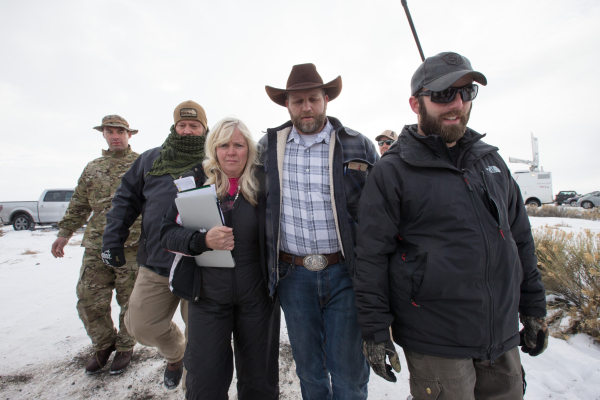
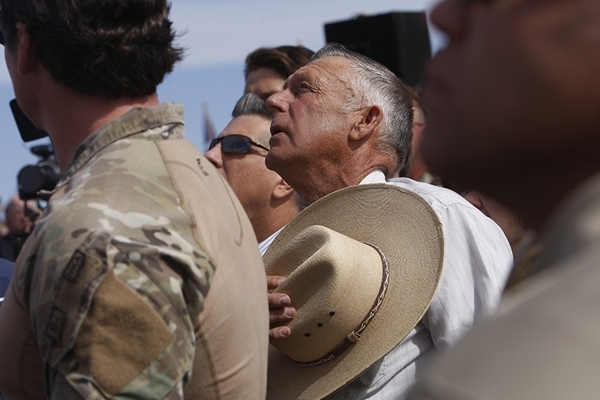
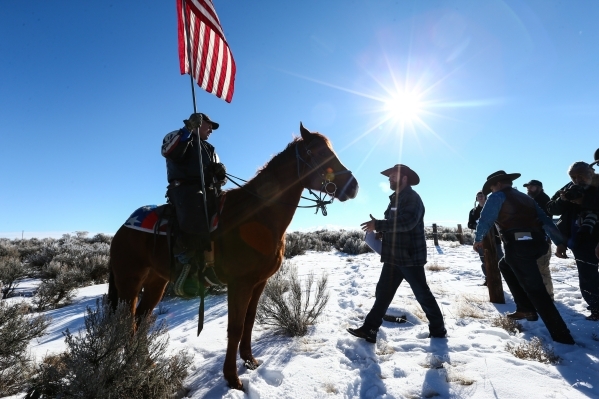
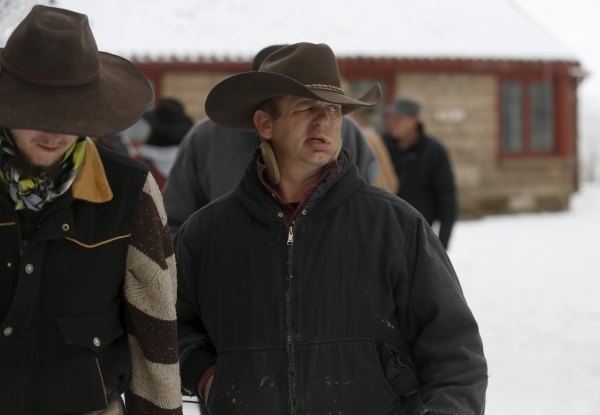

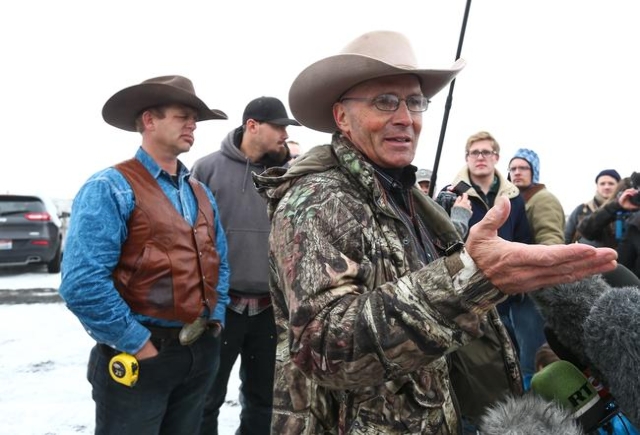
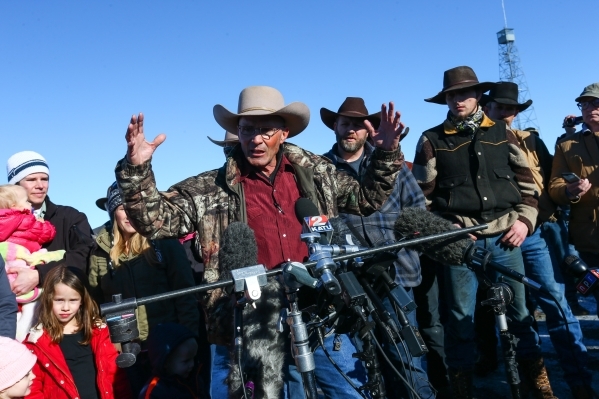
Supporters of turning federal lands over to states and counties have blasted home their message with dramatic activism — staring down federal agents in Bunkerville and holing up in a wildlife refuge.
Yet across the West, the movement has mostly played out in statehouses, albeit without success.
The American Lands Council, a Utah nonprofit led by Ken Ivory, a Republican legislator from Utah, wants to use existing public policy tools — Congress, statehouses or the court system — to alter land management.
But Ammon Bundy, the son of Bunkerville rancher Cliven Bundy, tried a different tack — overtaking the Malheur National Wildlife Refuge’s headquarters in southeastern Oregon and holding daily press conferences calling for the feds to leave ranchers be and cede the lands.
Ivory said, “I don’t see how holing up in a wildlife refuge is necessarily going to help them immediately. Our system isn’t a spectator sport. We’ve got to get in the game.”
Debates over land management won’t end if, or when, Bundy and his armed self-styled militia supporters finally pack up and leave the refuge.
Supporters say the federal lands are the equivalent of a modern-day Louisiana Purchase with the potential to enrich states and boost local economies. Opponents, including conservationists, say states and local counties lack the financial means to shoulder the enormous costs of managing lands and fighting wildfires.
The Oregon standoff, which began Jan. 2, puts some supporters of federal land transfers to states in a delicate position: They gently criticize the Bundys for making a mistake, but add that the standoff has put a spotlight on their broader cause.
The standoff both “helps and hurts” the cause, said Demar Dahl, an Elko County commissioner and rancher who led a state task force that examined land management.
“What Bundy did by going there, I thought that was a mistake,” said Dahl, who supports transferring land to the state. “What came from that was the light was really shown on what was going on over there.”
The Bundys started the Oregon protest because of the case of Oregon ranchers Dwight Hammond Jr. and his son Steven Hammond. A jury convicted the Hammonds in 2012 of starting fires on public lands, burning about 140 acres. Federal prosecutors said the fires were set to hide poaching. The Hammonds, who turned themselves in two weeks ago to start five-year federal prison sentences, said the fires were set to protect their property from invasive plants and wildfires.
Besides calling for the Hammonds to be freed, the Bundys have said the lands in Harney County, Oregon, must be transferred from the federal government to locals.
The Hammonds’ attorney has said the protesters don’t speak for his clients.
Past efforts
Well before the Bundy-led group squatted in the refuge, Ammon Bundy and his brother Ryan Bundy were in the Nevada statehouse.
In the 2015 session, Ammon Bundy testified in favor of Assembly Bill 408, which Assemblywoman Michele Fiore, R-Las Vegas, sponsored and which challenged federal control of public lands in Nevada. About 85 percent of Silver State land is managed by the federal government.
The bill died.
Ammon Bundy was among the bill’s supporters at the Legislature. His testimony then sounded much like his recent press conferences in Oregon. In the same breath, Bundy spoke of the Founding Fathers and quoted Scripture, stressing his belief that God created Earth for man to live upon.
“We can lose 1,000 federal court cases but the fact remains the same — the land and the resources belong to the people,” Bundy said March 31, according to meeting minutes. “Furthermore, I reference an even greater authority. For the record, let it be known that I believe in God.”
The federal court system hasn’t sided with the Bundys.
The Bureau of Land Management obtained two court orders to round up the cattle of Bunkerville rancher Cliven Bundy after he didn’t pay grazing fees required of ranchers who use federal public lands. Ultimately, Cliven Bundy, backed by armed protesters, had a standoff with federal agents in April 2014 and the agents released the cattle.
For Fiore, the issue remains important. She’s running for the GOP nomination for the open congressional seat of U.S. Rep. Joe Heck, R-Nevada.
The BLM, Fiore says, is “lawless” and commits “bureaucratic terrorism.” Nevadans, not bureaucrats in Washington, D.C., need to be in charge of the state’s lands, she said.
Of the BLM officials, she said, “They don’t know their ass from their elbow.”
Not everyone agrees, including people outside the bureau.
Critics weigh in
There is abundant criticism both of the Bundys’ methods and the idea that states can manage lands.
A study by the Denver-based Center for Western Priorities found states would have difficulty absorbing the costs of managing federal lands, particularly when accounting for expenses like extinguishing wildfires and cleaning up abandoned mines. U.S. Forest Service firefighting in Nevada cost $33 million in 2012. Cleaning up thousands of abandoned mines in Nevada would cost between $1 billion and $2.2 billion, the center estimates in its study, based on government data.
“The bottom line is the wildfire and mine cleanup costs alone could bankrupt a lot of these Western states,” said Aaron Weiss, a spokesman for the conservation organization. “It’s a huge liability right now that gets shared among all American taxpayers.”
Other conservationists concur.
“States are ill-equipped to be able to handle the finances of federal lands,” said Brian O’Donnell, executive director of the nonprofit Conservation Lands Foundation.
Arguments that Congress lacks the authority to have federal lands simply don’t pass muster, said John Freemuth, a professor and senior fellow for environment and public lands at the Cecil D. Andrus Center for Public Policy at Idaho’s Boise State University.
“There are so many examples of Congress doing things that have stood up in court,” he said. “For me, it’s a resolved issue completely.”
The view of transferring lands to the states doesn’t necessarily reflect the majority opinion in the West, Freemuth said. For example, Arizona voters rejected 2-1 a ballot measure in 2012 seeking support for state management of federal lands, including the treasured Grand Canyon National Park.
“They were a little stupid when they included the Grand Canyon in it,” Freemuth said, jokingly adding that the idea of a Grand Canyon State Park didn’t go over well.
He called the Bundy group’s widely reported actions — staying in federal buildings and cutting down a fence separating a ranch from the refuge — inexcusable.
“They’re nuts,” Freemuth said. “And I think that needs to be said.”
Contact Ben Botkin at bbotkin@reviewjournal.com or 702-387-2904. Find him on Twitter: @BenBotkin1












